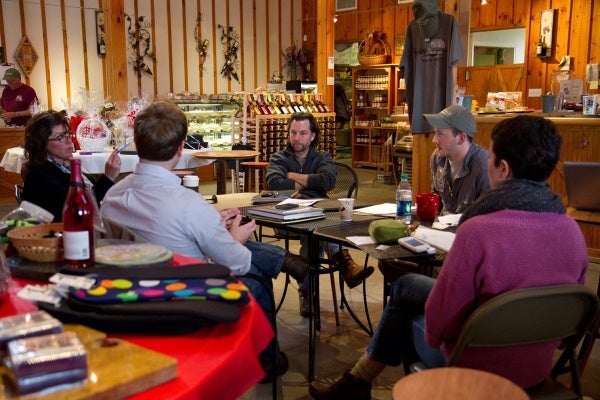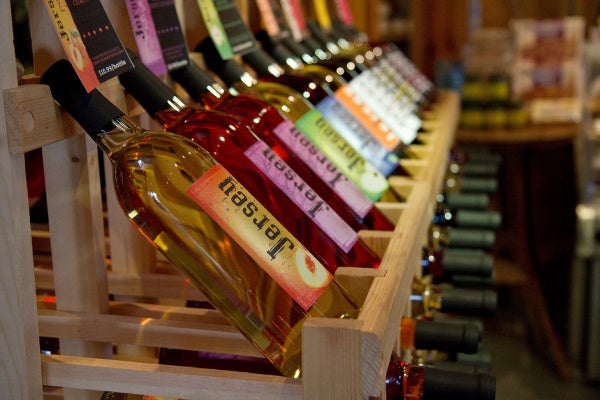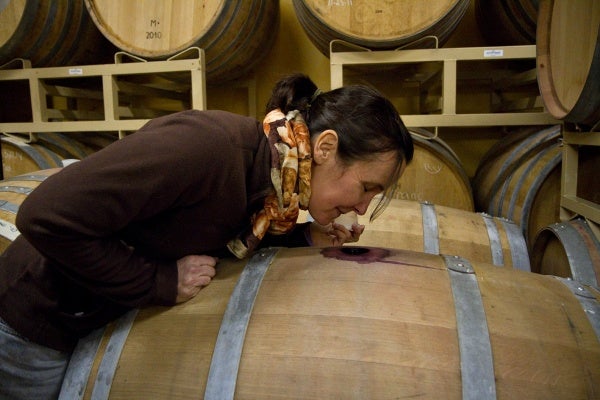With help from direct shipping, New Jersey vintners say it’s their time to shine
In Mullica Hill, N.J., seventh-generation farmer Richard Heritage looks out over his acreage.
“What’s neat is, just standing right here, you see the evolution of the property,” he said. “You still see some remaining peach trees, apple trees and the cows and the chickens from the entertainment farming. And then you also see the vineyards.”
Part one of a two part series on New Jersey wine.
In Mullica Hill, N.J., seventh-generation farmer Richard Heritage looks out over his acreage.
“What’s neat is, just standing right here, you see the evolution of the property,” he said. “You still see some remaining peach trees, apple trees and the cows and the chickens from the entertainment farming. And then you also see the vineyards.”
The Heritage family’s been working this land since 1853. In 1999, the farm fell on hard times, and the family almost sold to a developer. In an act of desperation, Heritage planted grapes.
Just 12 years later, the Garden State Wine Growers Association named Heritage Vineyards its winery of the year.
The French connection
“What is most important for people to know,” said Heritage, “is that the secret to making truly phenomenal wine is farmers.”
And good farming starts with good soil.
“The soil that we’re working with in New Jersey is what we call a loamy sand. Loamy meaning it does have some organic material, but it’s primarily sandy, rocky soil,” he said. “The rocks and the sand allow the water to drain through the soil, because grape vines do not like wet feet.”
Here in South Jersey, Heritage says the soil is similar to that in Bordeaux, France. And people are finally starting to notice.
“If we get rated in a national wine magazine for our reserved Bordeaux blend, how do you get that wine? You essentially can’t,” said Heritage. “So now, with direct shipping, you can read the article, go on your iPhone, buy the wine and it’ll arrive at your door.”
Not everyone’s toasting change
North of Heritage Vineyards, off Route 38 in Hainesport, Burlington County, Michael Maro’s looking out over his property, too. He owns Canal’s Discount Liquor Mart.
“The building we’re in is approximately 60 years old. And we had plans to build a new one here. And we figured we would have like the first really cool, green-energy store,” said Maro. “It’s been completely canceled.”
Maro scrapped the $5 million project earlier this year, when Gov. Chris Christie signed the direct shipping bill into law.
Because, he says, if people can just click around on their computers and get wine delivered to their homes, what do they need him for?
“The retailer and the wholesaler are going to be cut out of this,” said Maro. “If you’re selling less wine, you need less people. We’re planning ahead. That’s what we do in business.”
He says he’s already laid off a wine manager, and that more layoffs are inevitable. He doesn’t get why wineries should get direct access to his customers.
“There’s 2,000 liquor stores in New Jersey. Convenience is not a problem. You can’t drive three miles in either direction without going by a liquor store,” said Maro.
Shoppers will still need Canal’s if they’re looking for a Yellow Tail or a Robert Mondavi. The new law allows only those wineries that produce fewer than 250,000 gallons of wine a year to ship directly.
Leveling the field
So, just the little guys. And every winery in New Jersey, by that standard, is a little guy.
“It allows us to compete. It’s up to us to show that we belong. And we believe we will,” said Scott Donnini.
He also started making wine in 1999 in his South Philadelphia basement.
“It was just God awful,” said Donnini.
But he quit his job as a corporate lawyer to start his own winery in Pilesgrove, Salem County, anyway. Today, in his wine cellar, Donnini pops the top off a barrel and dips in a “wine thief” — basically an oversized eye dropper — to draw out a taste of an aging Classico blend from 2010.
“Well, this is what I would call a full-bodied red.” Donnini pauses to take a sip. “Gosh, this is so good.”
Even he seems surprised by how good a wine this Jersey soil has produced.
“On the front palate, it gets a nice acid, some nice black currant. There’s a heavy berry to it. Little bit of licorice on the back palate,” describes Donnini. “Wow.”
He says the rest of the world will be surprised when they try this wine too.
And he’s happy to prove it one direct shipment at a time.
Part two of the series will put New Jersey wineries to a blind taste test against European vintages.
WHYY is your source for fact-based, in-depth journalism and information. As a nonprofit organization, we rely on financial support from readers like you. Please give today.

















